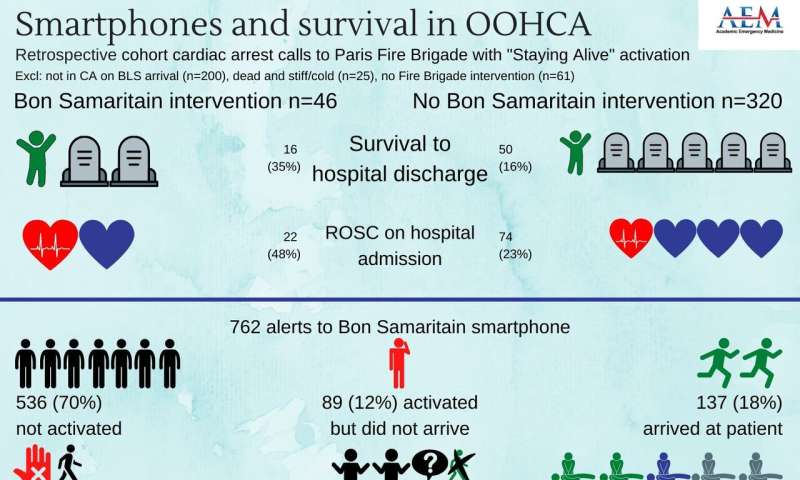#Mobile smartphone technology is associated with better clinical outcomes for OHCA

“#Mobile smartphone technology is associated with better clinical outcomes for OHCA”

Mobile smartphone technology can accelerate first responder dispatch and may be instrumental to improving out of hospital cardiac arrest (OCHA) survival. That is the conclusion of a study published in the October 2020 issue of Academic Emergency Medicine (AEM), a journal of the Society for Academic Emergency Medicine (SAEM).
The lead author of the study is Dr. Clement Derkenne, an emergency physician in the emergency medical department, Paris Fire Brigade, Clamart, France. The findings of the study are discussed in a recent AEM podcast, We Didn’t Start the Fire, But Can Antiacid Monotherapy Stop the Fire?
In France, the introduction of the mobile application “Staying Alive” (a free mobile smartphone application, available in 18 languages and compatible with all operating systems) improved healthcare delivery and OHCA survival outcomes within one year in the Greater Paris area (July 2017 to 2018).
The application allows registered first responders, commonly referred to as “Bons Samaritains” (BS), located near an OHCA scene, to be alerted via a “push notification.” Upon acknowledgment of the notification, available BS are directed toward the scene of OHCA and receive a map of AEDs in the area.
SA is available on all smartphone platforms and uses geolocalization services to flag nearby AEDs. It was first integrated to the Paris Fire Brigade Greater Paris Area CPR protocols in 2017.
The study researchers concluded that smartphone apps that match trained responders to nearby cardiac arrest victims may be a valuable way to improve response times in out of hospital cardiae arrest; however, their impact on clinical outcomes and overall cost effectiveness remains unclear.
Antacid monotherapy more effective in relieving epigastric pain than in combination with lidocain
Clément Derkenne et al, Mobile Smartphone Technology Is Associated With Out‐of‐hospital Cardiac Arrest Survival Improvement: The First Year “Greater Paris Fire Brigade” Experience, Academic Emergency Medicine (2020). DOI: 10.1111/acem.13987
Provided by
Society for Academic Emergency Medicine
Citation:
Mobile smartphone technology is associated with better clinical outcomes for OHCA (2020, October 30)
retrieved 30 October 2020
from https://medicalxpress.com/news/2020-10-mobile-smartphone-technology-clinical-outcomes.html
This document is subject to copyright. Apart from any fair dealing for the purpose of private study or research, no
part may be reproduced without the written permission. The content is provided for information purposes only.
For forums sites go to Forum.BuradaBiliyorum.Com
If you want to read more Like this articles, you can visit our Science category.



